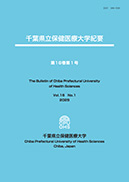Current issue
Displaying 1-35 of 35 articles from this issue
- |<
- <
- 1
- >
- >|
-
2025Volume 16Issue 1 Pages 1_3-1_11
Published: March 31, 2025
Released on J-STAGE: June 07, 2025
Download PDF (1064K) -
2025Volume 16Issue 1 Pages 1_13-1_20
Published: March 31, 2025
Released on J-STAGE: June 07, 2025
Download PDF (1046K) -
2025Volume 16Issue 1 Pages 1_21-1_28
Published: March 31, 2025
Released on J-STAGE: June 07, 2025
Download PDF (847K)
-
2025Volume 16Issue 1 Pages 1_29-1_34
Published: March 31, 2025
Released on J-STAGE: June 07, 2025
Download PDF (712K) -
2025Volume 16Issue 1 Pages 1_35-1_38
Published: March 31, 2025
Released on J-STAGE: June 07, 2025
Download PDF (9641K) -
2025Volume 16Issue 1 Pages 1_39-1_45
Published: March 31, 2025
Released on J-STAGE: June 07, 2025
Download PDF (822K) -
2025Volume 16Issue 1 Pages 1_47-1_55
Published: March 31, 2025
Released on J-STAGE: June 07, 2025
Download PDF (814K) -
2025Volume 16Issue 1 Pages 1_57-1_65
Published: March 31, 2025
Released on J-STAGE: June 07, 2025
Download PDF (901K) -
2025Volume 16Issue 1 Pages 1_67-1_75
Published: March 31, 2025
Released on J-STAGE: June 07, 2025
Download PDF (875K) -
2025Volume 16Issue 1 Pages 1_77-1_85
Published: March 31, 2025
Released on J-STAGE: June 07, 2025
Download PDF (808K) -
2025Volume 16Issue 1 Pages 1_87-1_94
Published: March 31, 2025
Released on J-STAGE: June 07, 2025
Download PDF (770K) -
2025Volume 16Issue 1 Pages 1_95-1_104
Published: March 31, 2025
Released on J-STAGE: June 07, 2025
Download PDF (862K)
-
2025Volume 16Issue 1 Pages 1_105-1_109
Published: March 31, 2025
Released on J-STAGE: June 07, 2025
Download PDF (705K) -
2025Volume 16Issue 1 Pages 1_111-1_116
Published: March 31, 2025
Released on J-STAGE: June 07, 2025
Download PDF (2487K)
-
2025Volume 16Issue 1 Pages 1_117-1_123
Published: March 31, 2025
Released on J-STAGE: June 07, 2025
Download PDF (761K) -
2025Volume 16Issue 1 Pages 1_125-1_132
Published: March 31, 2025
Released on J-STAGE: June 07, 2025
Download PDF (807K) -
2025Volume 16Issue 1 Pages 1_133-1_138
Published: March 31, 2025
Released on J-STAGE: June 07, 2025
Download PDF (1317K) -
2025Volume 16Issue 1 Pages 1_139-1_146
Published: March 31, 2025
Released on J-STAGE: June 07, 2025
Download PDF (863K)
-
2025Volume 16Issue 1 Pages 1_147
Published: March 31, 2025
Released on J-STAGE: June 07, 2025
Download PDF (528K) -
2025Volume 16Issue 1 Pages 1_148
Published: March 31, 2025
Released on J-STAGE: June 07, 2025
Download PDF (531K) -
2025Volume 16Issue 1 Pages 1_149
Published: March 31, 2025
Released on J-STAGE: June 07, 2025
Download PDF (521K) -
2025Volume 16Issue 1 Pages 1_150
Published: March 31, 2025
Released on J-STAGE: June 07, 2025
Download PDF (537K) -
2025Volume 16Issue 1 Pages 1_151
Published: March 31, 2025
Released on J-STAGE: June 07, 2025
Download PDF (561K) -
2025Volume 16Issue 1 Pages 1_152
Published: March 31, 2025
Released on J-STAGE: June 07, 2025
Download PDF (557K) -
2025Volume 16Issue 1 Pages 1_153
Published: March 31, 2025
Released on J-STAGE: June 07, 2025
Download PDF (553K) -
2025Volume 16Issue 1 Pages 1_154
Published: March 31, 2025
Released on J-STAGE: June 07, 2025
Download PDF (559K) -
2025Volume 16Issue 1 Pages 1_155
Published: March 31, 2025
Released on J-STAGE: June 07, 2025
Download PDF (558K) -
2025Volume 16Issue 1 Pages 1_156
Published: March 31, 2025
Released on J-STAGE: June 07, 2025
Download PDF (532K)
-
2025Volume 16Issue 1 Pages 1_157
Published: March 31, 2025
Released on J-STAGE: June 07, 2025
Download PDF (520K) -
2025Volume 16Issue 1 Pages 1_158
Published: March 31, 2025
Released on J-STAGE: June 07, 2025
Download PDF (546K) -
2025Volume 16Issue 1 Pages 1_159
Published: March 31, 2025
Released on J-STAGE: June 07, 2025
Download PDF (554K) -
2025Volume 16Issue 1 Pages 1_160
Published: March 31, 2025
Released on J-STAGE: June 07, 2025
Download PDF (557K) -
2025Volume 16Issue 1 Pages 1_161
Published: March 31, 2025
Released on J-STAGE: June 07, 2025
Download PDF (536K) -
2025Volume 16Issue 1 Pages 1_162
Published: March 31, 2025
Released on J-STAGE: June 07, 2025
Download PDF (538K)
-
2025Volume 16Issue 1 Pages 1_163
Published: March 31, 2025
Released on J-STAGE: June 07, 2025
Download PDF (577K)
- |<
- <
- 1
- >
- >|
